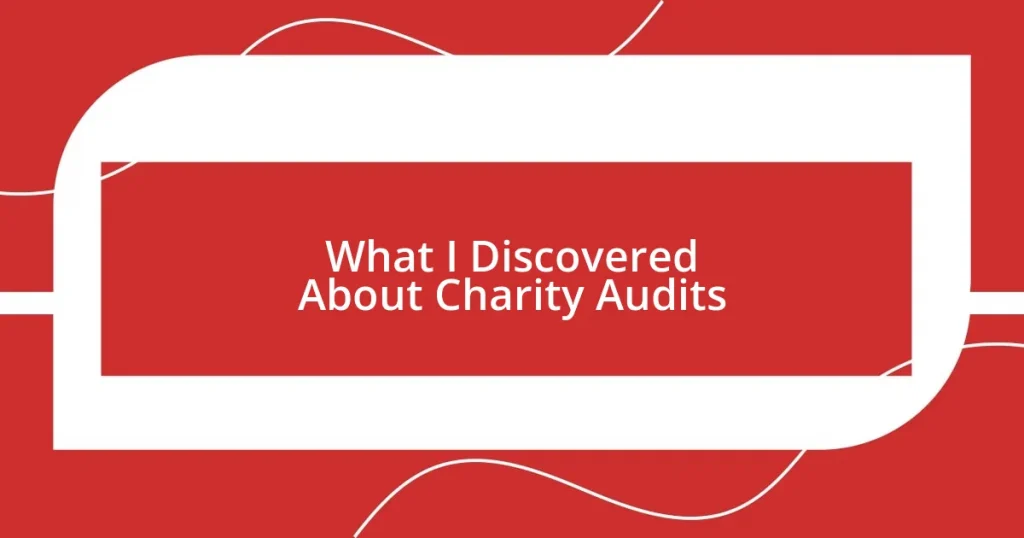Key takeaways:
- Charity audits enhance transparency and accountability, reassuring donors that their contributions are used effectively.
- They help identify operational inefficiencies and growth opportunities, leading to improved strategies and increased funding.
- Common misconceptions about audits include beliefs that they only benefit auditors or are solely punitive, whereas they actually foster growth and provide valuable insights for organizations.
- Best practices for future audits include proactive communication, continuous feedback, and integrating findings into strategic planning to drive organizational improvement.
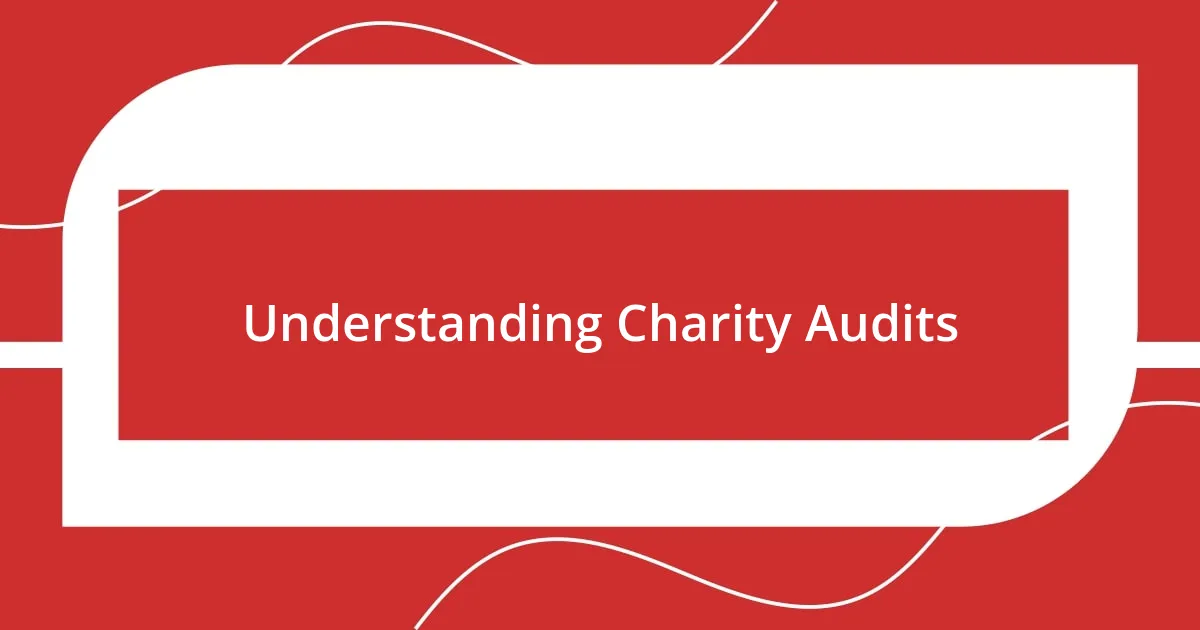
Understanding Charity Audits
Understanding charity audits can seem daunting at first, but they play a crucial role in ensuring transparency and accountability. I remember my first encounter with a charity audit; I felt a mix of curiosity and anxiety. I couldn’t help but wonder, “What do they really uncover?” It’s a fair question—charity audits examine financial records, ensuring that funds are used wisely and in alignment with the organization’s mission.
When I participated in an audit, the meticulous process shed light on areas where we could improve. Auditors don’t just look for mistakes—they offer insights that can enhance the charity’s operations. This experience underscored my belief that audits are not about finding faults, but rather about fostering growth and trust within the community.
A charity audit reveals more than just numbers; it uncovers the heart of an organization. Think about it: wouldn’t you want to know that your donations are being allocated effectively? That emotional reassurance is what drives many to support causes they believe in. Understanding this aspect of charity audits transforms them from mere check-ups into valuable tools for enhancing philanthropic impact.
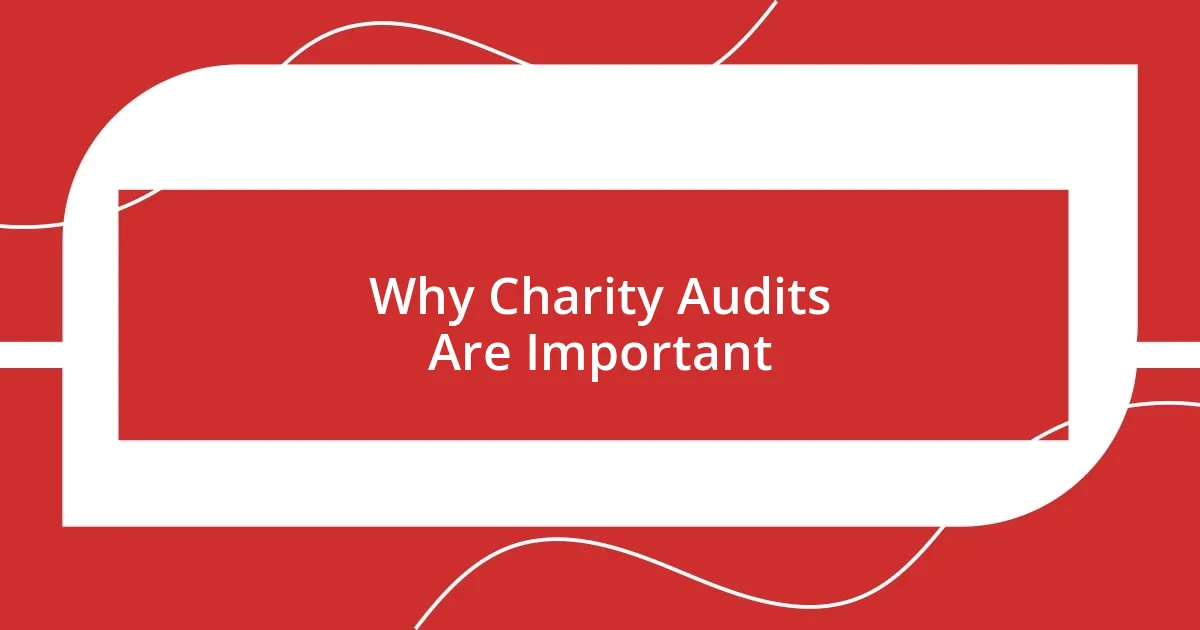
Why Charity Audits Are Important
Charity audits serve as a vital mechanism for fostering trust between organizations and their donors. I recall attending a community meeting where a charity shared their audit results—there was an unmistakable sense of pride in the room. People felt reassured knowing that their contributions weren’t just disappearing into the void; instead, they supported meaningful change backed by verified financial practices.
Furthermore, these audits are essential for nonprofit organizations as they help identify inefficiencies and highlight areas for improvement. I’ve seen firsthand how a thorough audit process can lead to more robust strategies. For instance, after our last audit, we discovered a previously overlooked funding opportunity that significantly boosted our outreach efforts, transforming not just our budget but also our impact on the community.
Lastly, performing regular charity audits enhances operational credibility. In a world where donors are increasingly vigilant about where their money goes, transparency is non-negotiable. I remember a powerful moment when a supporter revealed they chose our organization over others due to our accessible audit reports. This kind of transparency opens doors to funding opportunities and partnerships that might otherwise remain closed.
| Key Benefit | Description |
|---|---|
| Builds Trust | Reassures donors about the effective use of funds. |
| Identifies Improvements | Highlights inefficiencies and opportunities for growth. |
| Enhances Credibility | Increases transparency to attract more donors and partners. |
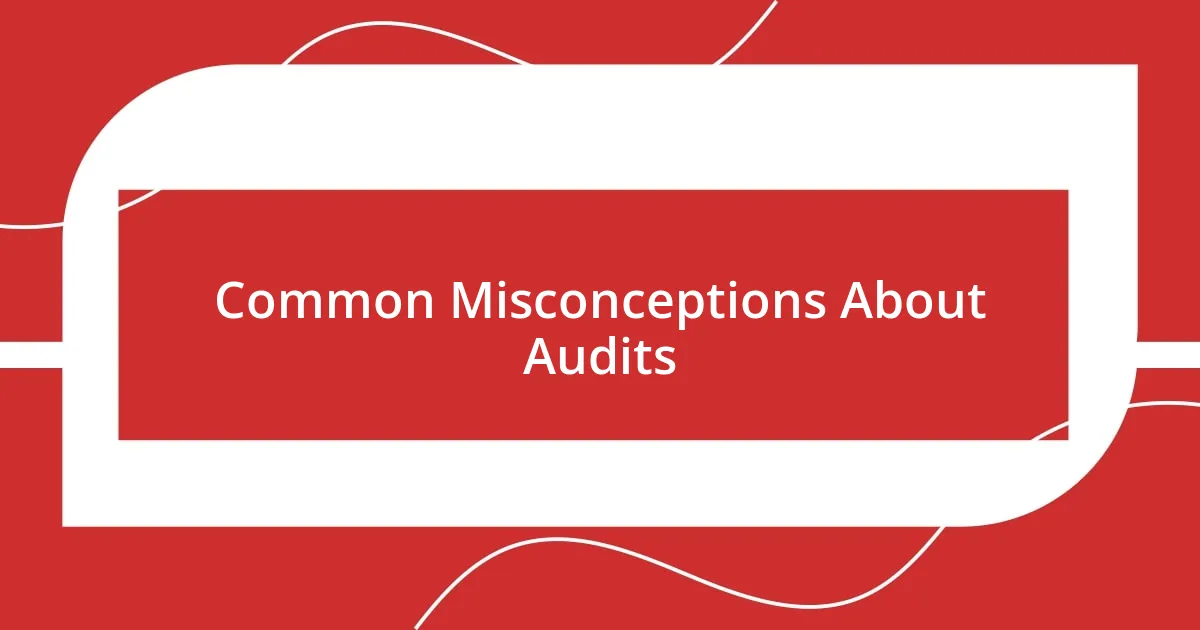
Common Misconceptions About Audits
Misconceptions about audits can considerably cloud perceptions surrounding their purpose and value. Many people think audits are solely about catching wrongdoing, which couldn’t be further from the truth. I once believed that audits primarily served as a punitive measure until I participated in one and realized they are actually tailored to enhance the overall health of an organization. It was an eye-opening experience that shifted my perspective, proving that audits can be a pathway to growth, not just scrutiny.
Here are a few common misconceptions regarding charity audits:
– Audits Are Only for Nonprofits with Problems: In reality, every charity can benefit from an audit to refine its operations.
– Auditors Are Just There to Find Mistakes: Their goal is to offer constructive feedback and identify strengths, not just pinpoint errors.
– The Process Takes Forever and Is Extremely Complicated: While it can seem daunting, a well-organized audit can be smooth and efficient.
I have also encountered the notion that audits are just formalities that don’t really impact day-to-day operations. Trust me, that misconception does a disservice to the potential insights audits can offer. During one audit, I witnessed how our team was able to uncover critical data about donor preferences and behavior that reshaped our fundraising strategy. The findings led to a surge in donations as we aligned our appeals with what our supporters truly valued. It was a reminder that audits can be a revealing exploration, shedding light on undercurrents we often overlook.
In summary, consider these additional myths surrounding charity audits:
– They Only Benefit the Auditors: On the contrary, the insights gained are invaluable for the organization itself.
– Everything Will Be Exposed and Lead to Embarrassment: Instead, it’s often a chance to celebrate achievements and recognize areas for growth.
– Only Large Charities Need Audits: Smaller organizations can also gain critical benefits, often discovering opportunities that larger entities miss.
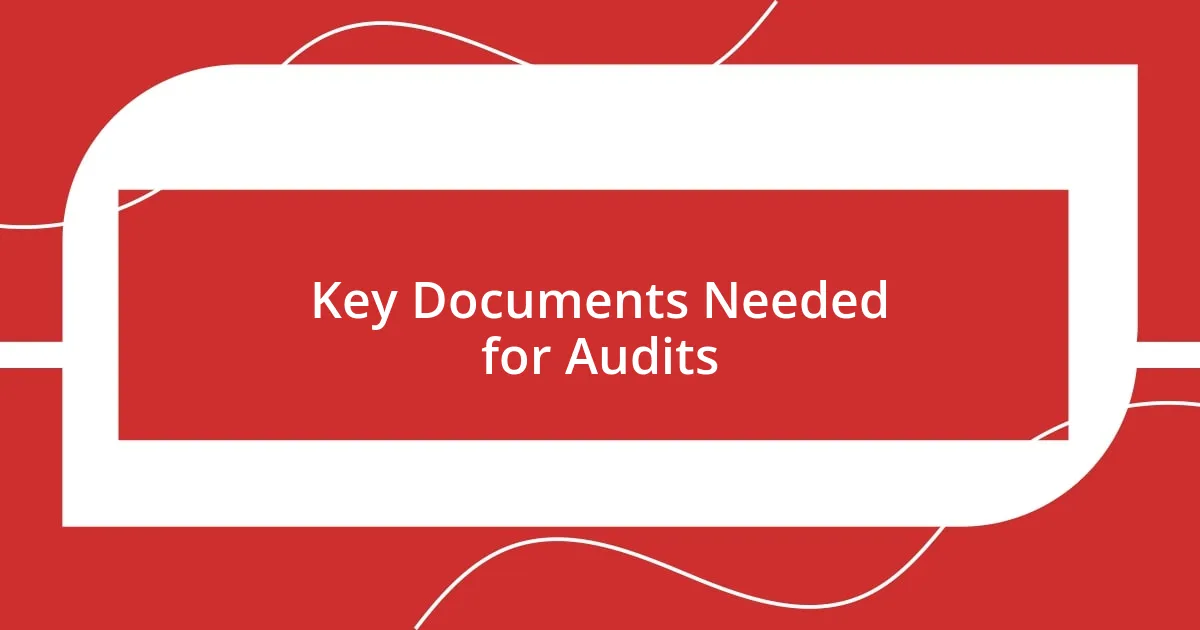
Key Documents Needed for Audits
When preparing for a charity audit, several key documents become essential to ensure a smooth process. One of the most crucial is the financial statement, which includes income statements and balance sheets. I can’t stress enough how having these numbers organized can save time. I vividly remember a time when my organization lacked clear financial documentation; it turned the audit into a chaotic experience. Having everything in order not only reflects professionalism but also provides a clear picture of the organization’s financial health.
Additionally, documentation related to donor contributions is vital. This includes records of individual donations, grants, and sponsorships. I’ve often found that the clarity of these records can reveal meaningful trends over time. During one audit, we discovered that a previously under-recognized supporter consistently donated more than I realized. The insights helped us deepen our relationship with that donor, opening doors for more significant contributions. It’s amazing how a little attention to detail can lead to such impactful outcomes.
Finally, don’t overlook organizational policies and procedures. These documents serve as a blueprint for governance and compliance, showcasing how your charity operates. I’ve seen firsthand how a strong set of policies can simplify discussions during audits. When our compliance procedures were clearly documented, the auditors could assess our adherence to laws and regulations swiftly, leading to a streamlined process. Isn’t it fascinating how seemingly mundane paperwork can play such a pivotal role in shaping a charity’s future?
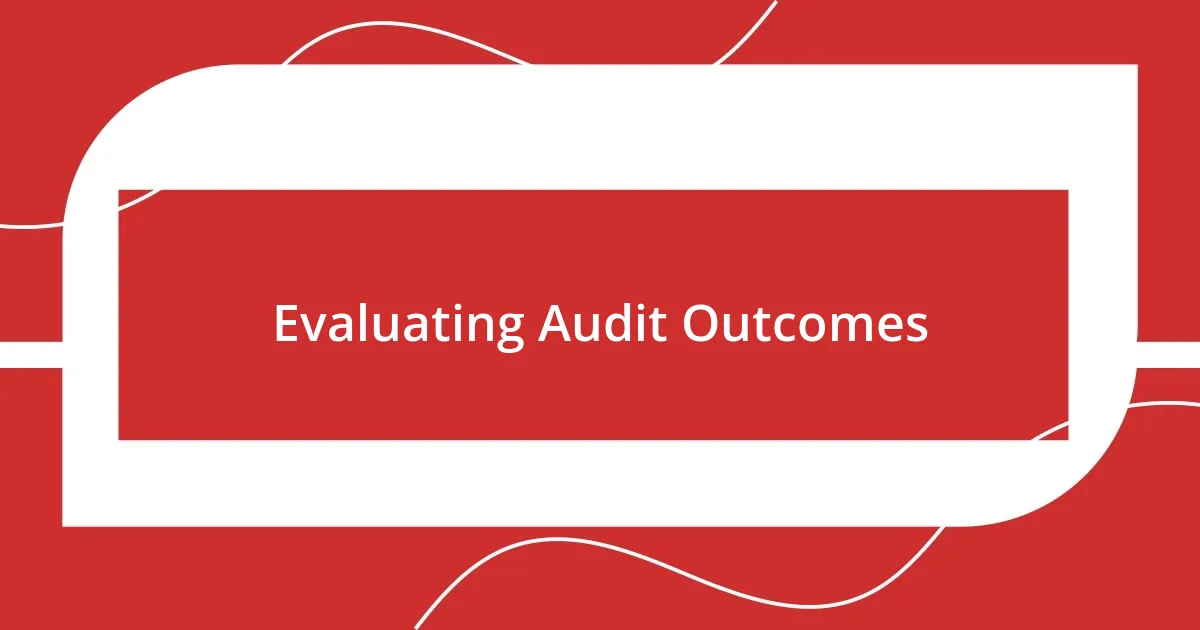
Evaluating Audit Outcomes
Evaluating the outcomes of an audit is a critical step in leveraging its findings for future growth. From my experience, successful audits aren’t just about compliance; they can also highlight strengths that the organization may not even recognize. I remember a time when an audit revealed that our volunteer engagement strategy, which I thought was merely average, was actually a standout compared to peer organizations. This realization motivated us to amplify our efforts, leading to increased volunteer retention and satisfaction.
Moreover, the discussions that arise during post-audit evaluations often provide invaluable insights. After one audit, our leadership team sat down to dissect the feedback, and I was genuinely amazed at how such conversations sparked innovation and collaboration. It reminded me of the importance of viewing these reports not as a checklist but as a springboard for strategic discussions. How often do we overlook the opportunities hidden within feedback? Personally, I’ve learned that taking time to reflect on audit results can illuminate paths we hadn’t considered before.
Lastly, I found that simply measuring compliance isn’t enough; we need to assess the impact of recommended changes. In one organization I worked with, recommendations led to a complete overhaul of our financial reporting practices. The follow-up evaluation demonstrated a marked improvement in transparency, which was not just satisfying but also reinforced our donors’ trust. Have you ever experienced a change that fundamentally transformed how a team operates? Through this process, I realized that the true value of an audit lies in the journey of continuous improvement it inspires.
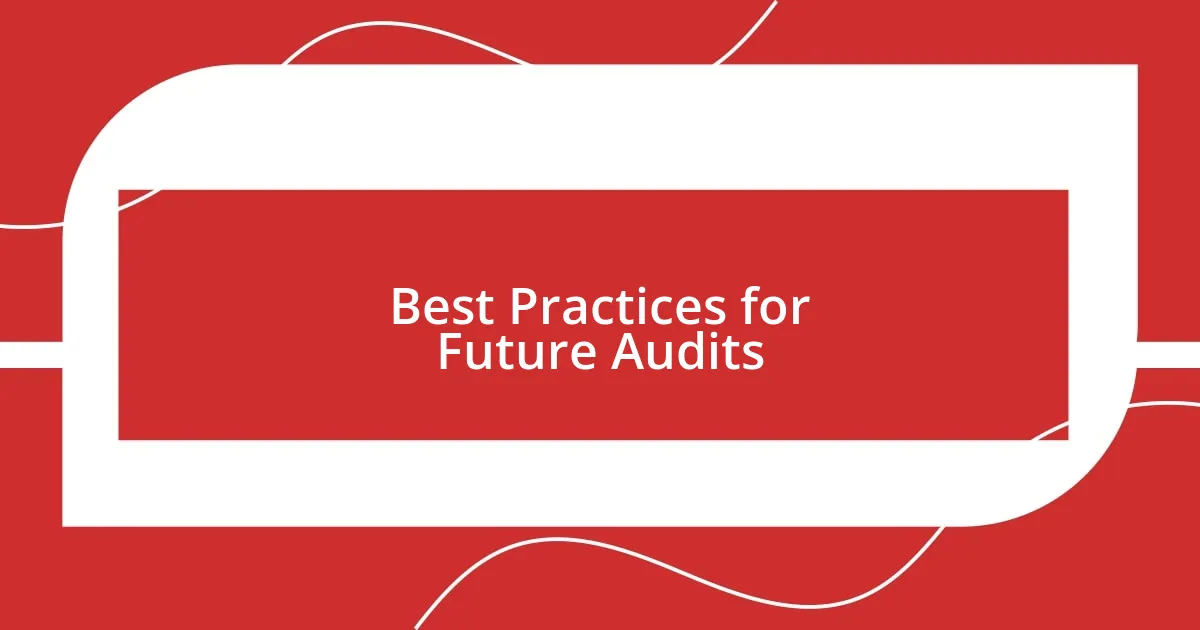
Best Practices for Future Audits
When preparing for future audits, I’ve found that proactive communication is essential. In my experience, touching base with the auditors early in the process can set a positive tone and clarify expectations. Once, I initiated a pre-audit meeting where we discussed our concerns and objectives; that simple step turned what could’ve been a stressful audit into a more collaborative and supportive endeavor. Isn’t it remarkable how open dialogue can transform the audit experience?
Another best practice is to implement a continuous feedback loop even outside of audits. After receiving feedback from auditors, I made it a point to share those insights with my team. Initially, it felt daunting, but over time, I discovered that fostering an environment where everyone feels empowered to contribute ideas can lead to more innovative approaches. Don’t you think auditing can be seen as a team activity, rather than a solitary process? Engaging everyone created a culture of accountability and improvement, which became incredibly rewarding.
Lastly, I’ve learned the value of integrating audit findings into our strategic planning. Instead of treating audit results as final reports, I advocate for using them as guiding tools for future initiatives. I recall a time when we realized that one area of expense could be streamlined. By incorporating those findings into our budgeting discussions, we’ve not only saved funds but also enhanced our program effectiveness. Have you ever thought about how much potential lies within an audit as a planning document? It certainly reshaped my perspective and led to meaningful growth in our organization.










